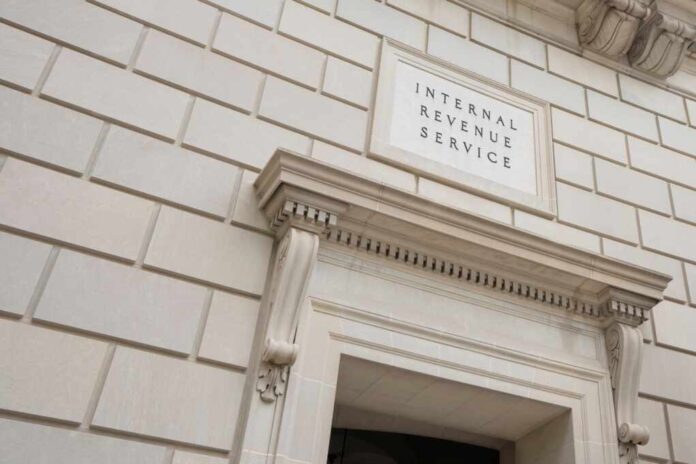
Twenty thousand IRS employees have accepted the Trump administration’s deferred resignation program, catalyzing a massive reduction in force that will reshape tax administration in America for years to come.
At a Glance
- Approximately 20,000 IRS workers (20% of the workforce) have accepted deferred resignations, receiving full pay and benefits until September 2025 but required to quit by February 2025
- The IRS plans to cut up to 40% of its workforce after the current tax filing season, reducing staff from 102,000 to between 60,000-70,000
- Key departments facing cuts include the Taxpayer Experience Office, Transformation Strategy Office, Online Services Office, and Office of Civil Rights
- Acting IRS Commissioner Melanie Krause is resigning partly due to concerns about sharing taxpayer information with Immigration and Customs Enforcement
- The reductions reverse the Biden administration’s expansion of approximately 20,000 IRS employees intended to increase tax revenue
Mass Exodus Begins at IRS
Federal workers across agencies, including the IRS, faced a February 6, 2025 deadline to accept or reject the Trump administration’s “deferred resignation” program. The program offers eligible employees full pay and benefits through September 30, 2025, with no work expectations, provided they submit resignations effective by the end of February. According to multiple sources, approximately 20,000 IRS employees—around one-fifth of the agency’s workforce—have accepted this offer, triggering an unprecedented staffing crisis at the tax collection agency.
The Trump administration communicated the urgency of these workforce reduction measures across multiple agencies. “As a reminder, the deferred resignation offer—which allows eligible employees to keep their government pay and benefits through Sept. 30, 2025, without any expectation of performing work—expires on Feb. 6, 2025,” stated Chris Nelson, the Agriculture Department’s acting chief human capital officer.
Reducing the IRS to Pre-Biden Levels
The current workforce reductions effectively reverse the Biden administration’s expansion of the IRS, which had added approximately 20,000 employees through funding provided by the Inflation Reduction Act. The Treasury Department has characterized these cuts as “the roll back of wasteful Biden-era hiring surges, and consolidation of critical support functions are vital to improve both efficiency and quality of service.” The agency will soon implement bi-weekly Reduction in Force (RIF) notices as part of a phased approach to downsizing operations.
“The Secretary is committed to ensuring that efficiency is realized while providing the collections, privacy, and customer service the American people deserve,” a Treasury Department spokesperson stated regarding the planned workforce reductions.
Impact on Tax Enforcement and Services
According to internal IRS documents, the agency plans to reduce its workforce from the current 102,000 employees to between 60,000 and 70,000—a reduction of up to 40%. The impact will be felt across all operations, with an internal memo noting that “taxpayer services and compliance will need to be trimmed.” The first phase of staff reductions will hit several offices particularly hard, including the Taxpayer Experience Office, Transformation Strategy Office, Online Services Office, and Office of Civil Rights.
“Under a hiring freeze, there is no way to compensate for normal attrition and make sure that retirees are replaced with the next generation of public servants trained to help Americans file their taxes and catch those trying to cheat the system,” warned Doreen Greenwald about the potential consequences of these staffing changes.
Reports indicate the IRS has already abandoned some audits due to staffing limitations. This development raises serious concerns about the agency’s ability to enforce tax compliance and maintain appropriate revenue collection, potentially leading to decreased federal revenue during a time of significant budget challenges.
Leadership Changes and Controversial Policies
Adding to the turmoil at the IRS, Acting Commissioner Melanie Krause and several other high-ranking officials have submitted their resignations. Their departures stem partly from concerns regarding a new agreement to share taxpayer information with Immigration and Customs Enforcement (ICE). This policy change has raised significant questions about taxpayer confidentiality protections and the traditional separation between tax administration and immigration enforcement activities.
Legal challenges to the administration’s deferred resignation program are mounting. Federal employee unions have filed lawsuits to halt the program, citing violations of the Administrative Procedures Act. Critics have also raised concerns about potential breaches of the Anti-Deficiency Act and congressional appropriations authority, as the program commits future funds to employees who will no longer be working.
The Path Forward
The IRS has already implemented a hiring freeze that remains in effect until the Treasury secretary determines it is in the national interest to lift it. This freeze has resulted in rescinded job offers for potential new hires with start dates after February 8 or those with unconfirmed start dates. As the agency prepares to operate with a significantly reduced workforce, it plans to “evaluate impact on operations post-Phase 1” of the reduction in force, according to internal documents.
While the Biden administration had expanded the IRS workforce with the stated goal of improving tax compliance among high-income earners and large corporations, the Trump administration’s approach focuses on streamlining operations and reducing federal spending. The ultimate impact on tax collection, enforcement, and taxpayer services will become clearer as these dramatic workforce changes take effect in the coming months.

























